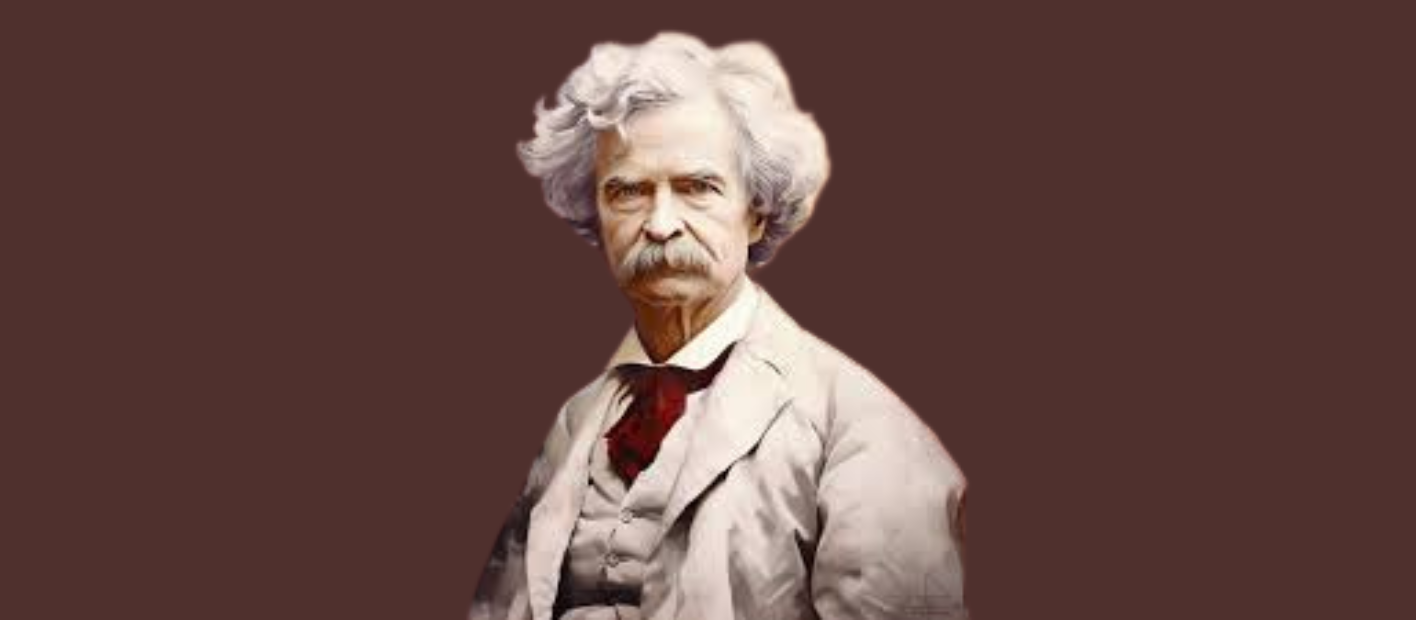Mark Twain: Humor and Humanity in Literature
Mark Twain, one of the most celebrated authors in American literature, has captured the hearts and minds of readers for generations. His works, laced with humor, satire, and profound insights into the human condition, continue to be revered for their unique ability to entertain and provoke thought. Twain’s writing transcends time, offering more than just laughter—it provides a mirror to humanity’s greatest strengths and flaws.
Born Samuel Langhorne Clemens on November 30, 1835, Twain’s legacy as a writer, humorist, and social critic is unmatched. His work is often characterized by his keen observations on the human condition, his mastery of wit, and his ability to dissect social norms with humor. He is best known for his novels The Adventures of Tom Sawyer and Adventures of Huckleberry Finn, which are hailed as some of the greatest works of American literature. However, Twain’s legacy extends far beyond these two masterpieces. His blend of humor and humanity in his writing offers timeless lessons on life, freedom, and society.
The Power of Humor in Twain’s Works
Humor is perhaps Mark Twain’s most distinguishing feature as a writer. Twain had an unparalleled ability to make people laugh, even when discussing serious or complex topics. His humor was not just for entertainment; it was a tool he used to engage his readers and communicate deeper truths about the world around him. Through wit and satire, Twain was able to expose the absurdities of human nature, social conventions, and even the prevailing political climate of his time.
One of Twain’s greatest achievements was his ability to use humor to critique society. In The Adventures of Huckleberry Finn, for example, he uses Huck’s adventures to poke fun at societal norms, especially those related to race and slavery. Huck’s relationship with Jim, the runaway slave, is a humorous yet poignant commentary on the moral dilemmas of slavery and human equality. Twain’s humor makes these weighty issues more accessible, encouraging readers to reflect on them with fresh eyes.
Twain’s humor also extended to his sharp criticism of human folly and greed. In The Gilded Age, co-written with Charles Dudley Warner, Twain satirizes the rampant corruption and materialism of post-Civil War America. Through wit and exaggeration, he lays bare the hypocrisy of the wealthy elite, showing how power and greed often overshadow justice and morality. His humor provides a lens through which readers can examine the flaws of society, making complex topics more approachable and relatable.
Twain’s Humanity: Deep Insights Into the Human Condition
While Twain’s humor is widely celebrated, it is his deep humanity that sets his work apart. Despite his sharp wit and satirical nature, Twain’s works are also filled with compassion for the human experience. His characters, often flawed and imperfect, are depicted with a sense of empathy and understanding, reflecting his belief in the goodness of people despite their flaws.
In Adventures of Huckleberry Finn, Twain presents Huck as a rebellious yet good-hearted boy who is caught between the social norms of his time and his own sense of morality. Huck’s internal struggle, particularly in his relationship with Jim, reflects Twain’s exploration of the complexities of race, friendship, and personal responsibility. Twain shows that even in a deeply divided society, there is room for personal growth and understanding, as Huck ultimately chooses to help Jim escape slavery, despite believing he may be committing a sin by doing so.
This compassion for humanity also appears in Twain’s The Prince and the Pauper, where he highlights the vast disparities between social classes and the arbitrary nature of wealth and power. Twain’s depiction of the two boys, Tom Canty and Edward VI, explores themes of identity, inequality, and empathy. Despite their vastly different circumstances, both characters share a common humanity, and Twain uses their experiences to question the moral foundations of class division and privilege.
Twain’s work often encourages readers to see the humanity in others, regardless of their social standing or background. Through his characters, Twain demonstrates that kindness, integrity, and empathy are universal traits that transcend social divides.
Twain’s Influence on American Literature and Society
Mark Twain’s influence on American literature cannot be overstated. His works laid the foundation for modern American fiction, particularly in their use of colloquial language, regional dialects, and rich character development. His ability to blend humor with social criticism has inspired countless writers, including contemporary authors who continue to use humor as a means of addressing serious societal issues.
Twain’s satirical voice also had a significant impact on the way Americans viewed their own society. His critiques of greed, corruption, and injustice challenged readers to think critically about the world around them. In many ways, Twain’s writing served as a call to action, urging readers to examine their own roles in perpetuating social inequalities and injustices.
Twain’s work has had a lasting impact on American culture and society, particularly in its ability to shine a light on the contradictions within the American ideal. His deep humanity, combined with his biting wit, has made his work an enduring source of inspiration for generations of readers and writers.
Mark Twain’s Legacy: Humor, Humanity, and Social Critique
Mark Twain’s legacy as a master of humor and social critique remains unparalleled in American literature. His works, while rooted in the specific social and political context of 19th-century America, continue to resonate with readers today. Twain’s humor, far from being just for entertainment, serves as a vehicle for social commentary and personal reflection. His exploration of human nature, inequality, and the complexity of societal norms offers timeless insights into the human experience.
Beyond his humorous anecdotes and satirical wit, Twain’s writing reminds us of the importance of empathy, kindness, and integrity. Through characters like Huck Finn and Tom Sawyer, Twain encourages us to look beyond the surface and see the humanity in others, even in the face of societal pressure or prejudice. His work urges us to confront the flaws in our society and work toward a more just and compassionate world.
As readers, we continue to find solace in Twain’s works because they remind us that humor can be a powerful tool for truth, and that beneath the laughter, there are profound lessons about the nature of humanity. In an age where humor often serves as an escape from reality, Twain’s ability to use humor to tackle the hardest truths is a testament to his enduring relevance.
Conclusion: The Timeless Appeal of Mark Twain
Mark Twain’s unique blend of humor and humanity has made him one of the most important figures in American literature. Through his sharp wit, keen social observations, and profound empathy for the human experience, Twain has left a lasting legacy that continues to inspire readers around the world. His works remind us that humor can serve as a mirror to society, revealing both its flaws and its potential for growth.
Twain’s timeless appeal lies in his ability to make us laugh while simultaneously urging us to think deeply about the world we live in. His legacy endures because it transcends time, offering readers of all ages lessons on the importance of humor, humanity, and social justice. As we continue to read and reflect on Twain’s works, we are reminded that the pursuit of truth, equality, and compassion is a journey that requires both a sense of humor and a deep understanding of our shared humanity.





